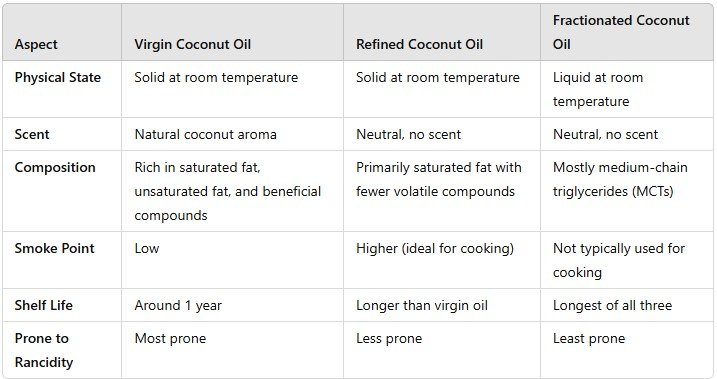How to Choose the Right Coconut Oil for Your Needs
Watch this YouTube video.
Coconut oil comes in three main types: virgin, refined, and fractionated. Understanding the differences between these types can help you select the best one for your specific purposes, whether it’s cooking, skincare, or crafting lotions. Let’s break it down step by step.
Key Differences at a Glance
The following table highlights the major distinctions between virgin, refined, and fractionated coconut oils:
Choosing Based on Use
For Skincare or Lotion Making
Fractionated coconut oil is a great choice if you’re crafting lotions or other skincare products. Its liquid consistency at room temperature makes it versatile and ensures a smooth application, even in varying climates.For Those Who Love Coconut Aroma
Virgin coconut oil retains the natural scent of coconuts, making it the perfect pick for those who enjoy its tropical aroma. Refined and fractionated oils, on the other hand, undergo processes that remove the aromatic compounds, leaving them scent-free.For Cooking
If you’re looking for an oil to cook with, refined coconut oil is your best bet. It has a higher smoke point, meaning it can withstand higher temperatures without burning, making it ideal for frying, sautéing, and baking.For Long-Term Storage
Fractionated coconut oil has the longest shelf life, thanks to its purity and resistance to oxidation. Virgin coconut oil, however, is more prone to rancidity because of its natural compounds and higher unsaturated fat content.
Understanding Composition and Quality
Virgin Coconut Oil: Contains about 80% saturated fat and 10% unsaturated fats, including Omega 9 and Omega 6, as well as vitamin E, polyphenols, and other beneficial compounds. Its unrefined nature means it retains many of the nutrients but is more sensitive to heat and oxygen.
Free Fatty Acids (FFA): FFAs are present in low concentrations in all plant oils and serve as a quality indicator. Higher FFA levels indicate lower oil quality. Both refined and fractionated oils undergo processes to reduce FFA content, making them purer and potentially better for long-term use.
Conclusion
Choosing the right coconut oil depends on your needs: virgin for its natural qualities and aroma, refined for cooking, and fractionated for versatility and longevity. Understanding these differences ensures you’ll make the most of this versatile and beneficial oil.


